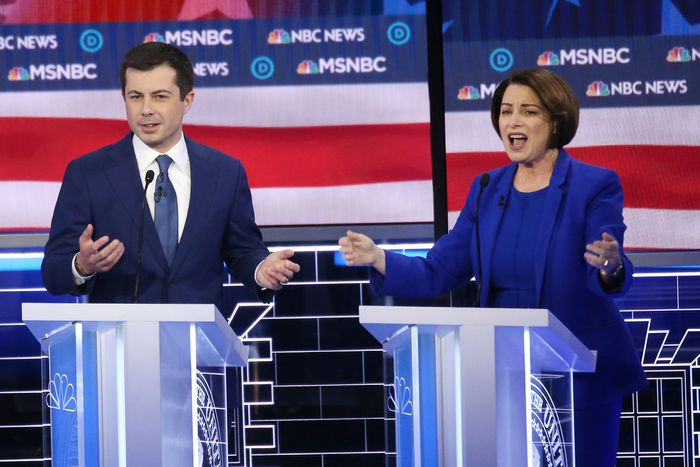
What happens with the voters who would have otherwise supported Pete Buttigieg and Amy Klobuchar in Tuesday’s elections and beyond remains an open question. Will they listen to their candidates and follow their endorsement of Joe Biden? Probably a majority of them, but not necessarily a big majority.
Meanwhile there is the related question of what happens to delegates pledged to candidates who subsequently quit. There aren’t very many of them: Buttigieg won only 26 delegates and Klobuchar only 7. But down the road it could matter more if, say, Bloomberg or Warren drop out after accumulating a significant pile of delegates on Super Tuesday or later in the contest.
The first thing to understand is that there is a small but very real difference in how the national-party rules treat delegates of candidates who have suspended their campaigns versus those who have formally withdrawn. Buttigieg and Klobuchar fall into the former category; it’s the most common thing for failed candidates to do since it gives them more time to settle the financial affairs of their campaigns, while also leaving the door cracked to a zombie campaign in case things get weird later on. And as nomination-contest wizard Josh Putnam (of the invaluable Frontloading HQ website) explains, the candidates retain some rights:
Their campaigns have been suspended but they are still technically candidates in the race. Even without any involvement from those two campaigns, delegate candidates of those two candidates in Iowa, New Hampshire and Nevada will continue in the delegate selection process. …
Most of the delegates won by these two candidates are district delegates. Buttigieg claimed nine district delegates in Iowa, six district delegates in New Hampshire and three district delegates in Nevada. Klobuchar was allocated one district delegate in Iowa and an additional four in New Hampshire. Ten of those 23 district delegates — the ones from New Hampshire — have already basically been chosen. Slates of district delegates were elected for each active candidate at pre-primary caucuses in the Granite state on January 25. Iowa district delegates will be selected on April 25 and Nevada Democrats will select their district delegates at the party’s May 30 state convention. If the Buttigieg and Klobuchar campaigns are still in suspension at those points, then they will retain those delegates and they will all become free agents upon selection.
This last point is important. Delegates pledged to candidates who have quit the race really are free agents, since the only real compulsion governing them is a “pledge” required by the national party to do their best to represent the jurisdictions that elected them. Unlike Republicans, who called such delegates “bound,” Democrats rely on more of an honor system, aside from the fact that campaigns typically choose delegate slates from which delegates are “pledged” (yes, a few states have laws that seek to bind delegates until “their” candidates have formally withdrawn, but it’s unclear they can be enforced at a convention).
The trickiest situation involves PLEO delegates — party leaders and elected officials who are pledged delegates, as opposed to the unpledged ones, who are better known as superdelegates. PLEO delegates are elected statewide but then pledged to candidates. The process for selecting them typically occurs later in the year. A candidate who has suspended her or his campaign still retains the right to whatever share of these delegates she or he earned, which, if nothing else, denies them to others.
Ultimately, there’s no real way to force any pledged delegate to honor the spirit of the system and stay committed at the convention, much less in the case of a second ballot in which 771 superdelegates would come into play. But you’d have to figure that delegates pledged to candidates who are no longer really in the race would be the loosey-est gooses of them all if the nomination isn’t already buttoned down tight before the opening gavel falls in Milwaukee.






























